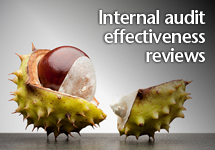Professional (HIA)
Overview
As a Professional (HIA), it's pivotal that you understand how to develop yourself and your team as well as build powerful partnerships with the board and audit committee, thereby becoming their ‘trusted adviser’. As the leader of internal audit activity, you have overall responsibility for delivering the internal audit function's efficiency and effectiveness. You are also a key starting point for determining the quality of execution, which includes risk-based internal audit plans, and strategic plans aligned to an organisations goals and objectives. Leading by example, you'll work closely with colleagues across the organisation in areas including risk, fraud, security and GDPR.
Contents
Typical responsibilities
HIAs must lead from the front and manage their teams with knowledge and expertise. Your key responsibilities are as follows:
- Planning, supervising and quality-checking engagements
- Communicating results to senior stakeholders, discussing and agreeing remedial actions, and monitoring engagement outcomes
- Critically evaluating the inherent risk and control implications of different business processes
- Developing and delivering a risk-based audit programme to help an organisation succeed
- Developing stakeholder relationships and acting as an independent assurer
- Lead and manage projects and investigations as required by senior stakeholders
Knowledge
1. Commercial awareness
IA Professionals understand how to critically evaluate/interpret the internal and wider external environment of the organisation being audited.
Relevant guidance
|
Research report: The role of internal audit in non-financial and integrated reporting |
2. Corporate governance and risk management
IA Professionals understand characteristics of good corporate governance and risk management, including the strategic role of IA.
Relevant guidance
|
What is good Corporate Governance |
|
|
Governance of risk: Three lines of defence When should an organisation establish an internal audit activity? |
3. Organisational strategy, structures and business processes
In respect of an organisation’s approach to audit planning and reporting, IA Professionals understand risk and control implications of different organisational structures, business processes and IT systems.
Relevant guidance
4. Risk and control/audit methodology
IA Professionals know the types of controls to manage the risks, management control techniques, and internal control framework characteristics.
Relevant guidance
5. Management/leadership principles
IA Professional understand management skills/leadership styles, conflict management, project management & change management.
Relevant guidance
Skills
1. Building Relationships
IA Professionals build long-term relationships based on trust and respect, both within IA and with management across an organisation.
Relevant guidance
|
Position paper: Internal audit’s relationship with external audit Raising the profile of internal audit |
2. Communication
IA Professionals communicate clearly and succinctly, both verbally and in writing, turning complex issues into plain language.
Relevant guidance
3. Influencing and collaboration
IA Professionals wield influence and motivate others through collaboration to remove organisational barriers, manage conflict, reach consensuses and achieve results.
Relevant guidance
|
Raising the profile of internal audit |
4. Analytical and problem solving
IA Professionals determine use of data analytics/data extraction software, and communicate requirements to others.
Relevant guidance
|
Computer assisted audit techniques (CAATs) |
5. Business acumen
IA Professionals interpret/articulate key risks impacting organisations and apply wider understanding to drive audit plans.
Relevant guidance
|
Risk appetite – concept and theory
|
Risk appetite – the board’s role |
6. Risk control and audit methodology
IA Professionals understand different types of control, management control techniques and internal control framework characteristics used in organisations.
Relevant guidance
|
Annual internal audit coverage plans |
7. Delivery management
IA Professionals lead/manage audit assignments to deliver quality work against a set budget and timeline.
Relevant guidance
|
Ensuring quality in the smallest internal audit activities |
8. Managing others
IA Professionals act as role models, motivate others to deliver results, create environments to encourage creative thinking, and manage through others to deliver results.
Relevant guidance
|
Coordination of assurance services How to set up a new internal audit activity |
Models of effective internal audit |
9. Systems and IT skills
IA Professionals effectively use business systems/software to deliver IA outcomes.
Relevant guidance
|
Research report: Data analytics Using internal audit software – top tips |
Behaviours
1. Ethics and integrity
IA Professionals will act with integrity to their profession and the ethical code of conduct of their organisation/auditee, acting as a role model.
Relevant guidance
2. Adding value/continuous improvement
IA Professionals apply their knowledge of the organisation and wider context to identify improvements/opportunities to meet objectives and deliver on promises.
Relevant guidance
|
Supervising an audit engagement |
3. Professional development
IA Professionals take responsibility for own/audit team’s professional development by seeking out opportunities to learn and grow, and are mindful of others wellbeing, encouraging resilience.
Relevant guidance
|
Internal audit document retention |
4. Proactive and adaptable
IA Professionals are proactive, able to think ahead to adapt their approach to manage conflicting priorities as circumstances and priorities change.
Relevant guidance
5. Professional scepticism
IA Professionals demonstrate an attitude that includes a challenging mind and being alert to conditions that may indicate possible misstatement of information due to error or fraud.
Relevant guidance
|
Things to consider when preparing for your annual internal audit opinion |
Auditing business functions
In addition to specific guidance to meet the needs of internal auditors at the various stages of their career, there is a generic range of functions and subject areas that inform all levels of our competence framework.
Got a question?
Our technical team are on-hand to answers any questions you may have, whether that be in relation to your skill-level or a specific piece of guidance.






